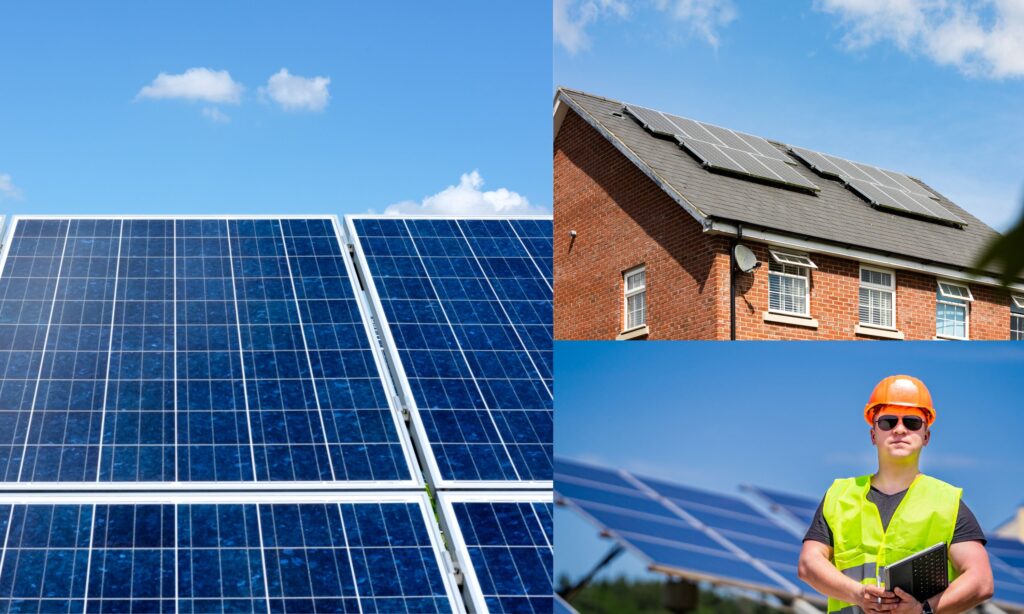Does it seem like everyone in your neighborhood is going solar?
That’s because it’s never been a better time to get solar and start saving on your monthly utility costs.
Electrical prices have been rising and we don’t expect a slow-down anytime soon. It’s not too late to put solar panels on your home, office, rental or outbuildings.
Solar panels, (also known as photovoltaic arrays (PV systems)), are a clean way to generate electricity. Photovoltaic systems can help homeowners reach their goal of energy independence by generating electricity directly from the sunlight. Solar panels are also a great way to generate energy that is compatible with electricity grids already in use, and if your PV system produces more power than your home needs, the excess can be shared with neighbors and in most states, the solar-powered household is compensated for providing that electricity.
PV systems can have a large initial cost, but they can last up to 30 years and, within about 10 they pay for themselves plus some. So after that, they are basically providing the household with free electricity.
Please see what Connecticut has to offer below!
Residential:
Connecticut homeowners interested in going solar can take advantage of several rebates and incentives to make their solar investment even more financially appealing. Here are some of the key incentives available in Connecticut:
- Residential Solar Investment Program (RSIP): The RSIP provides a performance-based incentive for homeowners who install solar photovoltaic (PV) systems. The program offers homeowners a fixed payment based on the system’s production over a ten-year period. The incentive amount varies depending on system size, location, and performance.
- Federal Solar Investment Tax Credit (ITC): The federal government offers a tax credit for residential solar installations. The ITC allows homeowners to deduct a percentage of the solar system’s cost from their federal taxes. As of 2021, the tax credit is set at 26% of the total system cost. However, it’s important to note that the ITC percentage may change in the coming years, so it’s advisable to consult a tax professional for the most up-to-date information.
- Property Tax Exemption: In Connecticut, solar PV systems are exempt from property taxes. This exemption means that the added value of the solar system will not increase your property taxes. It allows homeowners to enjoy the benefits of solar energy without incurring additional financial burdens.
- Sales and Use Tax Exemption: Connecticut offers a sales and use tax exemption for residential solar energy systems. This exemption helps reduce the upfront costs associated with installing solar panels by eliminating the state sales tax on qualifying equipment.
- Net Metering: Connecticut’s net metering policy allows homeowners with solar systems to receive credit for any excess electricity their system produces. When the solar panels generate more electricity than the home consumes, the excess power is sent back to the grid, and homeowners receive credits that can offset future electricity bills.
By taking advantage of these rebates and incentives, Connecticut homeowners can significantly reduce the upfront costs and long-term expenses associated with going solar, making it a financially attractive and environmentally responsible choice.
Still unsure if solar is right for you? Do you own commercial properties a farm or rentals?
Consider these additional incentives for installing solar:
- Solarize Connecticut: Solarize Connecticut is a community-based program that offers discounted pricing for residential and commercial solar installations. Through this program, communities negotiate discounted rates with solar installers, making solar more affordable and accessible for residents and business owners.
- Green Bank Commercial Property Assessed Clean Energy (C-PACE): The Connecticut Green Bank offers C-PACE financing for commercial property owners looking to invest in clean energy upgrades, including solar installations. C-PACE provides attractive financing options with long-term, fixed-rate loans that are repaid through property tax assessments.
- Federal Business Energy Investment Tax Credit (ITC): Business owners who install solar systems are eligible for the federal Business Energy Investment Tax Credit (ITC). This tax credit allows businesses to deduct a percentage of their solar system’s cost from their federal taxes. As of 2021, the ITC stands at 26% for commercial installations.
- USDA Rural Energy for America Program (REAP) Grants: Agricultural businesses located in rural areas may qualify for grants through the USDA REAP program. These grants provide financial assistance for renewable energy system installations, including solar, helping offset the costs for agricultural operations.
- Connecticut Property Assessed Clean Energy (C-PACE): The Connecticut Green Bank’s C-PACE program also extends to commercial properties. It offers competitive financing for qualifying energy-saving projects, including solar installations, to help businesses reduce energy costs and enhance sustainability.
If you have any questions or are curious about making solar work for you, call us at: 860-617-6139 or email us at: sales.manningenterprizes@gmail.com. We look forward to hearing from you!










